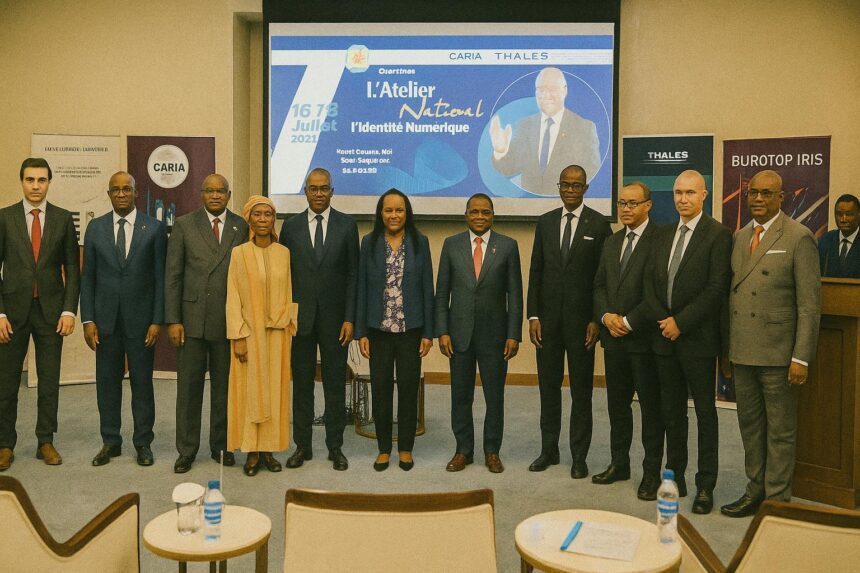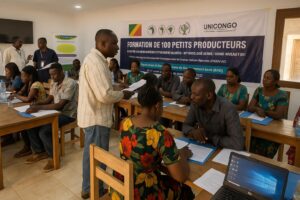Strategic Vision Behind Congo Digital 2025
The call issued in Brazzaville by Minister Léon Juste Ibombo to forge a secure digital identity backbone is more than a technical undertaking; it epitomises the flagship ambition of the “Congo Digital 2025” agenda to convert the Republic of Congo into an inclusive knowledge economy. In a region where demographic pressures intersect with accelerating connectivity, the ability to authenticate citizens with precision promises enhanced service delivery, streamlined fiscal mobilisation and, crucially, a stronger social contract. Officials perceive the project as a way to vault over legacy administrative constraints and to entrench the State’s presence in every district, from Pointe-Noire’s industrial corridors to the most remote Sangha villages.
World Bank Backing and Private Expertise
The Project for the Acceleration of the Digital Transformation (PATN), financed to the tune of USD 100 million by the World Bank (World Bank 2023), provides the financial architecture underpinning the new identity ecosystem. International partners see Brazzaville as a demonstrator for fair-cost, open standards solutions on the continent. French technology group Thales, represented at the national workshop by Laurent Jutard, brings its encryption pedigree and prior deployments in Ghana and Morocco to the table, offering tokenisation protocols designed to minimise data exposure. The triangulation of multilateral financing, private-sector engineering and State stewardship gives the initiative a hybrid governance model that many African administrations now favour when navigating complex digital infrastructure.
Legislative Architecture for Trust
Officials are keenly aware that technology alone does not breed legitimacy. A draft bill on personal data protection, inspired by the African Union Convention on Cyber Security and Personal Data (African Union 2021), is expected to reach parliament during the next ordinary session. It delineates consent protocols, clarifies retention periods and establishes an independent supervisory authority with sanction powers calibrated to local realities. By embedding privacy-by-design principles into law, policymakers intend to avert the ‘function creep’ anxieties that have clouded similar programmes elsewhere. The government further signals that the forthcoming digital wallet will honour user-centric design, granting citizens granular control over credential sharing.
Security Imperatives in a Volatile Region
Prefect Bonsang Oko Letchaud framed the digital identity rollout as a bulwark against trans-border threats that have tested Central Africa’s security architecture. Unified biometric registries permit real-time verification at checkpoints, facilitating cooperation with the Economic Community of Central African States and INTERPOL databases. Given the Sahelian spill-overs of illicit trafficking, Brazzaville’s wager is that modern identification tools can reinforce intelligence fusion without curtailing lawful mobility. The Ministry of the Interior, custodian of civil status, therefore treats the digital ID module as an extension of national defence doctrine rather than a standalone IT reform.
Human Capital at the Heart of Modernization
The success of any identity infrastructure ultimately rests on the engineers who maintain it and the citizens who trust it. Government scholarships targeting 2 000 Congolese students in cryptography, network forensics and user-interface design are slated to commence this academic year, echoing policy advice from the United Nations Development Programme on local talent retention (UNDP 2022). In parallel, regional civil registrars are receiving handheld enrolment kits to capture biometric data in situ, closing the urban-rural gap that has historically hampered accurate population statistics. By threading capacity-building into each project milestone, Brazzaville hopes to pre-empt a dependency on external contractors and to forge a domestic digital elite.
Interoperability and International Standards
Technical teams have opted for the MOSIP open-source framework, compatible with ISO/IEC 19794 biometric templates and ICAO e-passport specifications. Such alignment eases cross-border recognition, a pre-condition for deepening intra-African trade under the AfCFTA. It also allows future layering of digital public goods, from e-prescriptions to land registry tokenisation, without wholesale reinvestment. Thales executives emphasise that data will reside in sovereign cloud facilities located in Brazzaville and Pointe-Noire, yet mirror sites in Johannesburg and Marseille will ensure continuity of operations. This architecture balances resilience with the constitutional mandate that public archives remain on Congolese soil.
A Measured Path Toward Sovereign Data
Neither Minister Ibombo nor his technical advisers underestimate the social choreography required to enrol thirteen million citizens within a three-year horizon. Civic education campaigns, co-produced with faith leaders and civil-society groups, will be indispensable to inoculate the project against misinformation. Still, the prevailing consensus among diplomats stationed in Brazzaville is that the initiative projects a forward-leaning, security-conscious and economically savvy image of the Republic of Congo at a moment when digital sovereignty has become a litmus test of state capacity. If executed with the transparency and prudence outlined at the national workshop, Congo-Brazzaville’s digital identity gambit may well serve as an instructive blueprint for the sub-region.




















